- Messages
- 37,676
- Reaction score
- 6,480
- Points
- 288
WASHINGTON, Dec 5 (Reuters) - U.S. Supreme Court justices on Tuesday appeared hesitant to upend a tax on Americans who have invested in certain foreign corporations, as they pondered the meaning of "income" in a case that could undermine efforts by some Democratic lawmakers to impose a wealth tax on the very rich.
The justices heard arguments in an appeal by Charles and Kathleen Moore - a retired couple from Redmond, Washington - of a lower court's decision rejecting their challenge to the tax on foreign company earnings, even though those profits have not been distributed to shareholders.
More:

 www.reuters.com
www.reuters.com
The justices heard arguments in an appeal by Charles and Kathleen Moore - a retired couple from Redmond, Washington - of a lower court's decision rejecting their challenge to the tax on foreign company earnings, even though those profits have not been distributed to shareholders.
More:

US Supreme Court wary of upending tax on Americans' foreign earnings
U.S. Supreme Court justices on Tuesday appeared hesitant to upend a tax on Americans who have invested in certain foreign corporations, as they pondered the meaning of "income" in a case that could undermine efforts by some Democratic lawmakers to impose a wealth tax on the very rich.






